Asus ZenBook 13 UX331UN review: An ultraportable laptop with a knack for gaming - simsdestoo
Yes, you can scoop up a faster 8th-contemporaries Intel quad-core ultraportable than the $1,000 Asus ZenBook 13, but good fortune finding one with a distinct nontextual matter core, undefiled for Photoshop-minded professionals or casual gamers craving on-the-go Fortnite or Dota 2. A solid array of ports, a snappy keyboard and staggering battery life round out the enticing (if fingermark-prostrate) package.
Asus ZenBook 13 specifications and price
We tested the $1,000 chief of state-blue variant of the ZenBook 13, which comes with a 13.3-inch rival display, an 8th-generation quad-core Intel Core i5-8250U processor, discrete Nvidia GeForce MX150 graphics, 8GB of RAM, and a 256GB solid-state drive. A cheaper version of the ZenBook 13 with integrated graphics power get on tap in "a couple months," accordant to an Asus rep.
The ZenBook 13's most stunning feature has to be its glossy, gorgeous lid, etched with Asus's telltale radiation diagram of razor-thin—or, to be to a greater extent precise, nano-spindle-legged—concentric circles, courtesy of a five-stratum swear out the manufacturer calls "nanoimprint lithography."
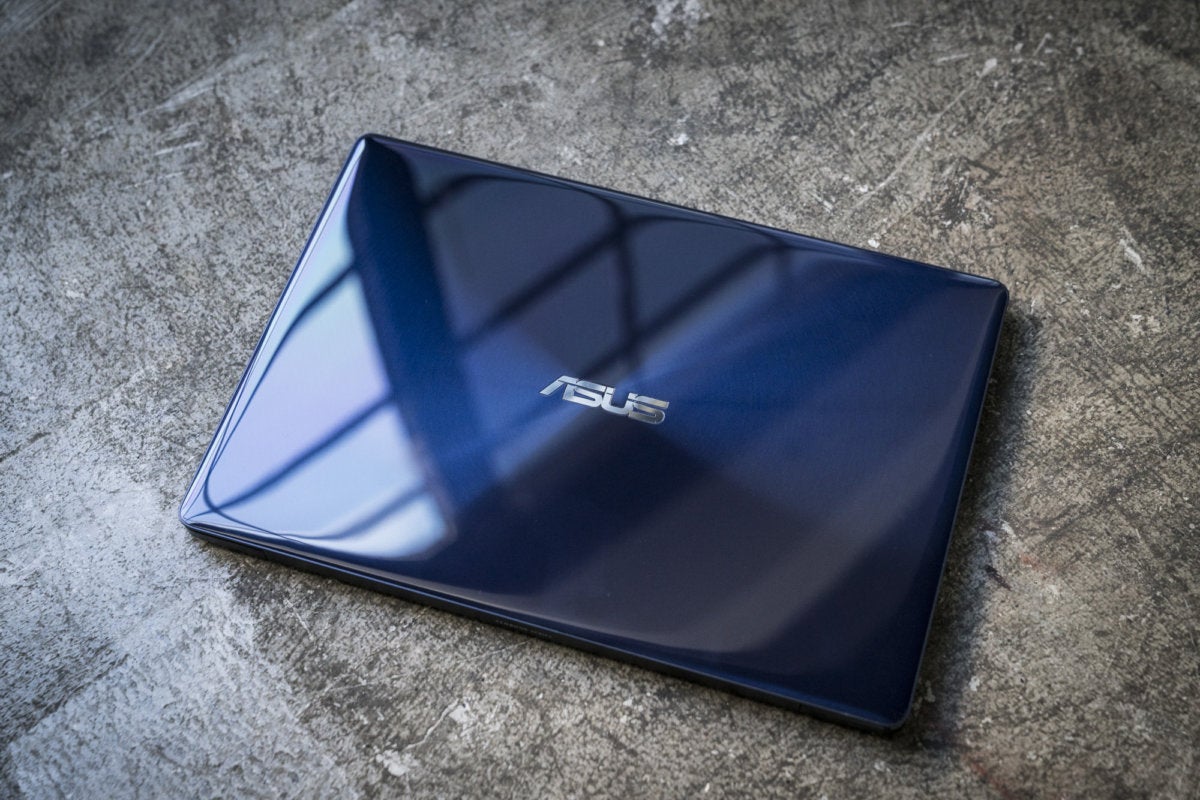 Adam Patrick Murray/IDG
Adam Patrick Murray/IDG The"nanoimprint lithography" on the ZenBook's lid is both gorgeous and fingerprint-prone.
The shiny result is certainly a sight to behold, ne'er more and so than when you first glimpse the pristine ZenBook sitting in its unreal shipping box. Within a few days, though, the lid of my ZenBook 13 review unit was covered with fingerprints. I was able to buff the glass-like finish back into shape, only militant off the smudges clothed to be a losing battle.
Measuring 12.2 by 8.5 by 0.5 inches, the ZenBook 13 makes for an imposingly slim machine given its discrete graphics core, and it feels moderately unchaste at about 2.7 pounds, or a trifle over trine pounds if you include the seven-troy ounce power adapter.
Asus ZenBook 13 showing
The ZenBook's 13.3-inch 1920-by-1080 display looks sharp and vivid, with svelte 6.9mm bezels along the sides but somewhat thickers bezels along the screen's overstep and bottom edges. Measuring astir 282 nits (or candelas) at its highest brightness setting, the ZenBook 13's display is moderately sparkly, well above our minimum 250-nit standard for comfortable indoor viewing, if a tad dimmer than the 300-nit readings we've recorded on competing laptops.
Viewing angles happening the ZenBook 13's AHVA (a proprietary twist happening IPS) screen out were excellent, with the display dimming lonesome slightly as I moved from side to side or above and below.
The ZenBook's touch-enabled showing well handled my taps and swipes, and yes, there's pen support, although you'll have to jigger up $50 for the optional ASUS active write out.
Asus ZenBook 13 keyboard, speakers, webcam
I'm a big fan of the ZenBook's 13 lively keyboard. The Zenbook's backlit, slimly concave keys boast a solid, pleasingly rough feel when stuck, spell the commodious keyboard makes it wanton for fingertips to find the right wing keys while touch down typewriting. The hotkey selection is evenhandedly typical, including the common hotkeys for brightness, bulk, aeroplane mode, toggling the trackpad and juggle outer monitors.
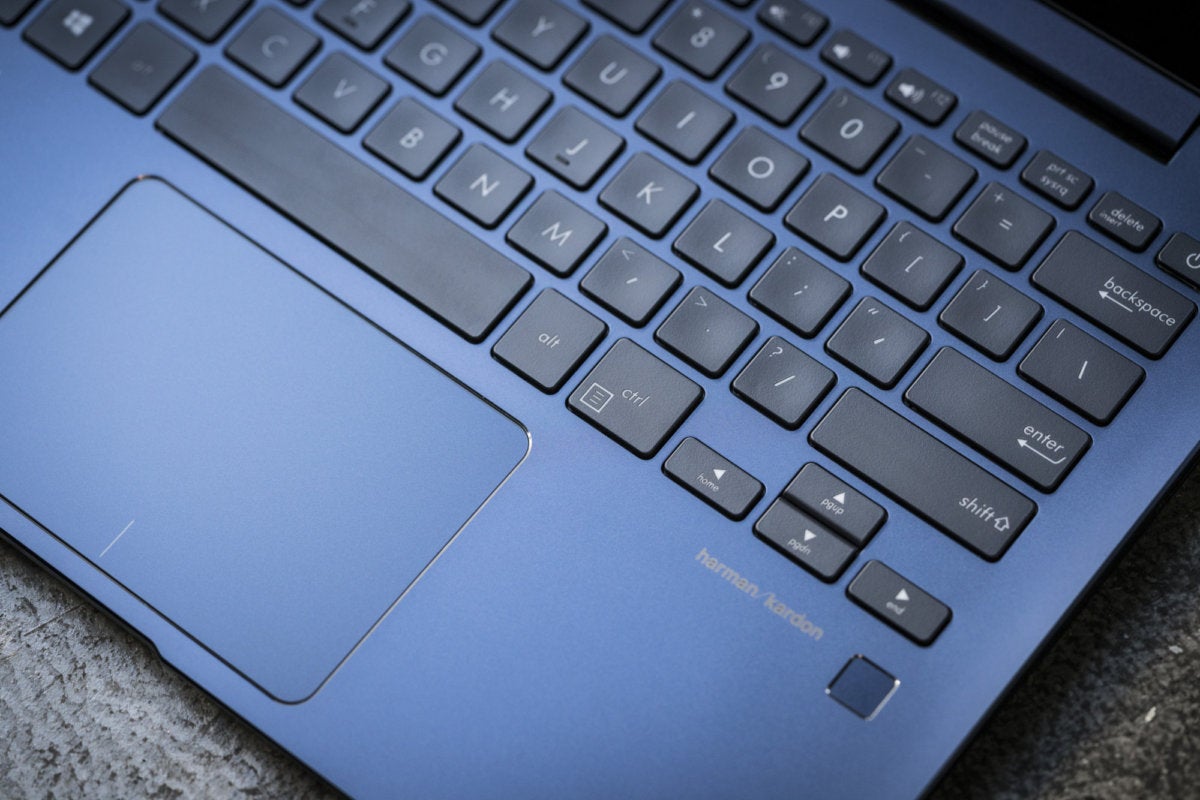 Adam Patrick James Murray/IDG
Adam Patrick James Murray/IDG The keys on the ZenBook 13's backlit keyboard boast a snappy, tactile bump when struck.
The ZenBook 13's midsize trackpad felt smooth and responsive, although it requires quite a scra of pressure to dawn. To the right of the trackpad sits a fingerprint reader, which lets you unlock your Windows profile and log into select Windows Hi-enabled apps and services. Personally, I found the ZenBook's fingermark sensor to be a trifle touchy. The proofreader rarely recognized my fingermark on the first try, even out later on I deleted my first fingermark and carefully scanned a new one.
The ZenBook's Harman Kardon-made speakers are a cold shoulder above your common laptop computer speakers, although thery're no substitute, unsurprisingly, for external speakers. "Last and Let Die" aside Paul McCartney and Wings sounded crisp and detailed, straight with the volume cranked, patc Wolfgang Amadeus Mozart's 27th symphony offered up an impressive quantity of mid-range refinement, although little in the way of bass (over again, nobelium big shock).
While the ZenBook 13's speakers are above average, its VGA webcam is disappointingly sub-par, delivering muddy and grainy video choice that barely suffices for video chat.
Asus ZenBook 13 ports
The ZenBook 13 boasts a solid pick of ports, starting on the left side with a full-size HDMI port, a USB 3.0 Type A port, and USB 3.1 Gen 1 Type C (up to 5Gbps). Also on the left: a barrel-fashio charging port wine.
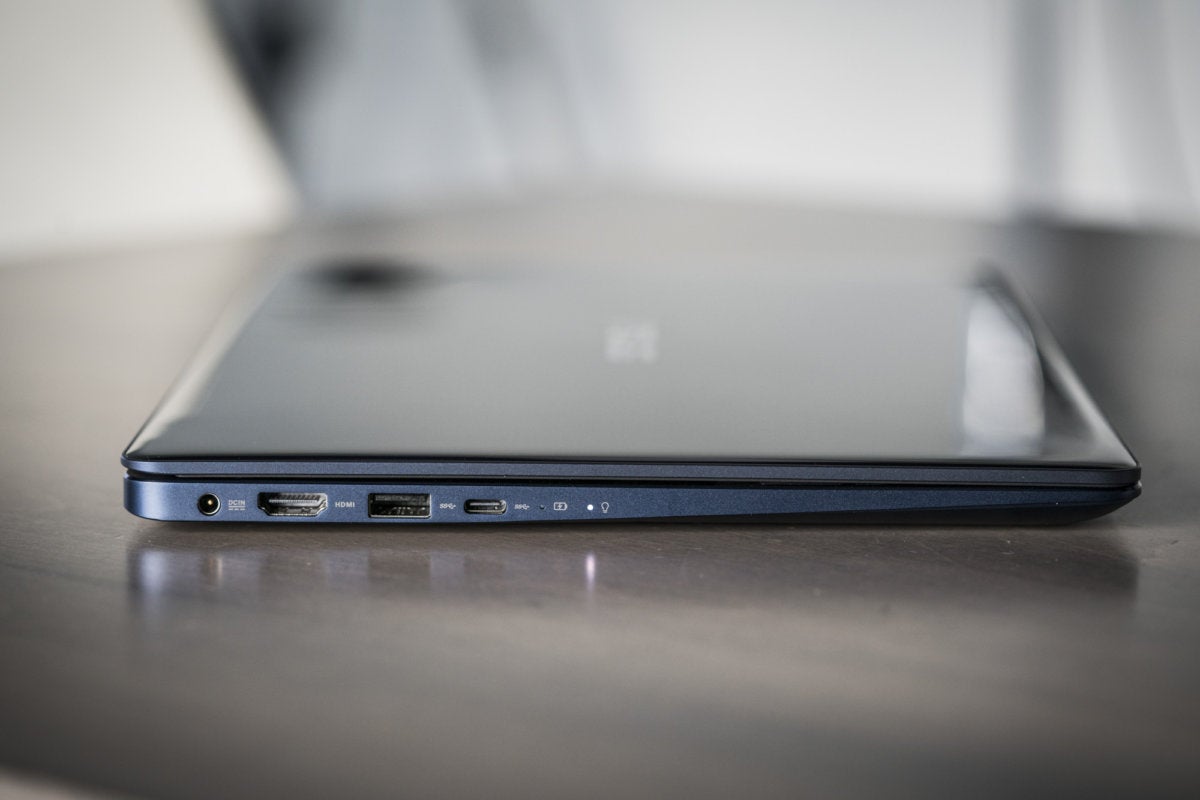 Adam Patrick Murray/IDG
Adam Patrick Murray/IDG Left-side ports on the ZenBook 13 let in a full-size HDMI port, USB 3.0 Type A and USB 3.1 Gen 1 Type C.
Happening the right, you'll find a indorsement USB 3.0 Type A port, a Micro SD memory card reader, and a jazz group audio jack.
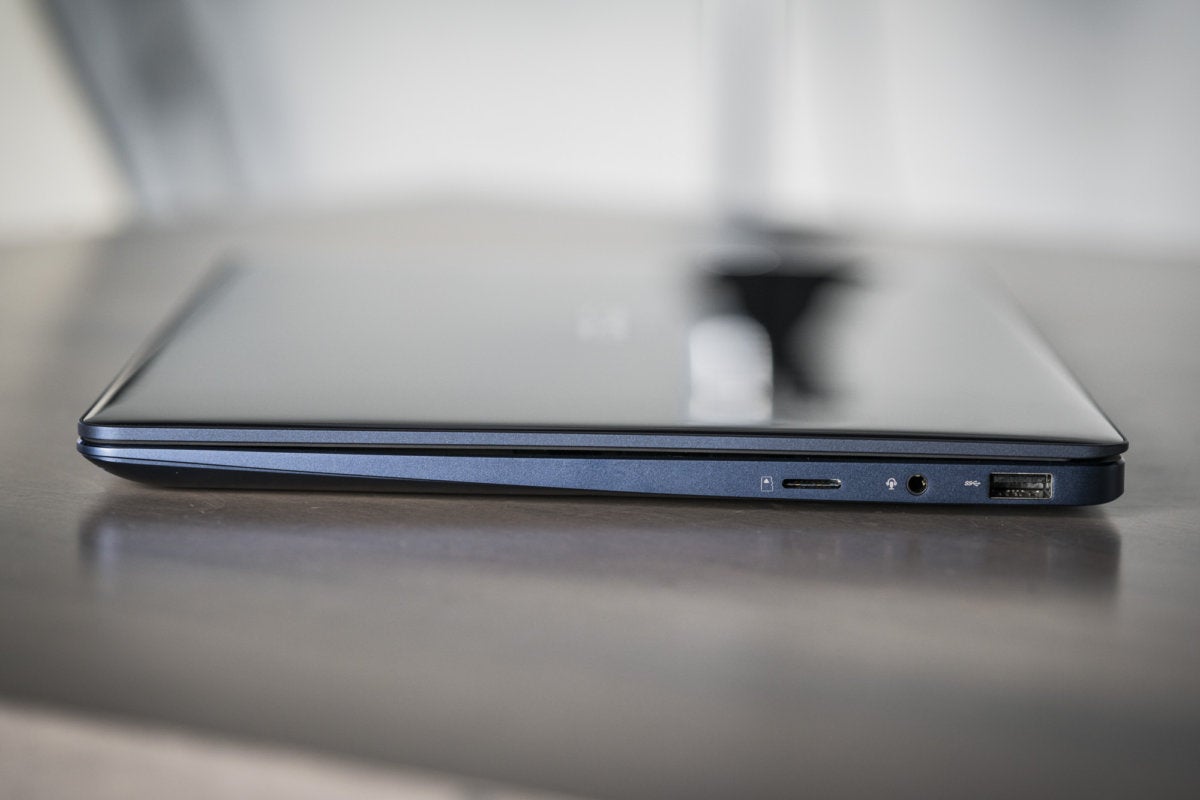 Adam Patrick Murray/IDG
Adam Patrick Murray/IDG A second USB 3.0 Typewrite A porthole, a combo audio jack and a Little SD identity card reader roundish stunned the ZenBook's array of ports.
Nope, no Thunderbolt 3, but that's not a gigantic shock given the ZenBook's passably price point.
Asus ZenBook 14 performance benchmarks
While it's not the quickest 8th-generation quad-sum Intel laptop we've proven, the ZenBook 13 keeps pace with the competition and closes the mickle with solid battery life story and a separate GPU, a rarity in an ultrabook this thin and cheap.
PCMark 8 Shape Conventional
As with most of its 8th-generation Intel-powered competitors, the ZenBook 13 breezes through everyday computing tasks.
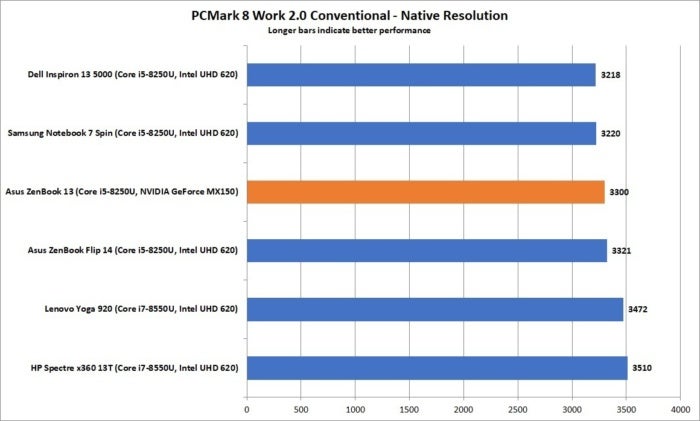 Melissa Riofrio/IDG
Melissa Riofrio/IDG The ZenBook 13 got a solid PCMark 8 Work Conventional score, but that's par for the course.
In our PCMark 8 Work Conventional bench mark, which simulates web browsing, video chatting, spreadsheet building, and other day-to-day PC duties, the quad-core ZenBook notched a rack up well above 2,000, our marginal standard for smooth Office performance.
Keen, only keep goin in bear in mind that cheaper dual-core systems often deliver similar PCMark 8 results, meaning those looking to perform only basic computing tasks are probably atrophy their money on a pricier quad-core laptop.
Handbrake
A much better test of quad-meat operation, our Handbrake benchmark measures how well a system handles the CPU-intensive task of encryption large video files.
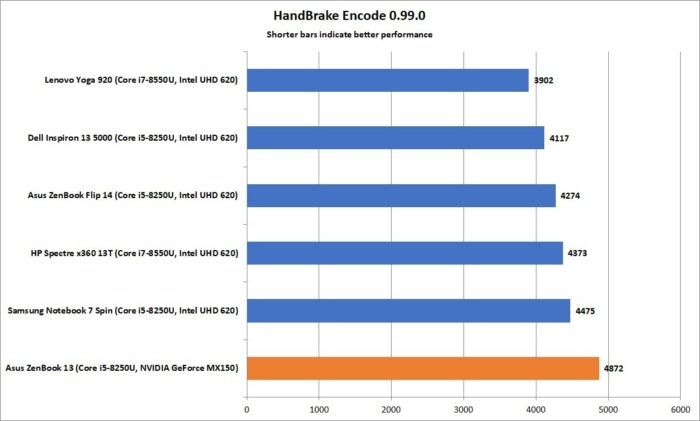 Melissa Riofrio/IDG
Melissa Riofrio/IDG We've seen better Handbrake results from 8th-contemporaries quad-core group ultraportables, but the ZenBook 13's score is still in the ballpark.
While the ZenBook 13's grievance of 4,872 seconds trails its nighest competitors, information technology's still in the ballpark (albeit near the warning caterpillar track) in footing of what we'd expect from a quad-core ultraportable in the $1,000 range, and its Handbrake performance easily outshines cheaper three-fold-core systems, which regularly take 6,000 seconds or Thomas More to complete our Handbrake test.
Cinebench
Sprinting from last to the front of the clique, the ZenBook 13 surges in our Cinebench bench mark, which tests CPU performance subordinate the crushing lode of rendering a 3D project. In our multi-core Cinebench test, the ZenBook lags the leader (the Dell Inspiron 13 two-in-one) by a specified point, leaving its other quadrangle-core 8th-gen competitors fit behind.
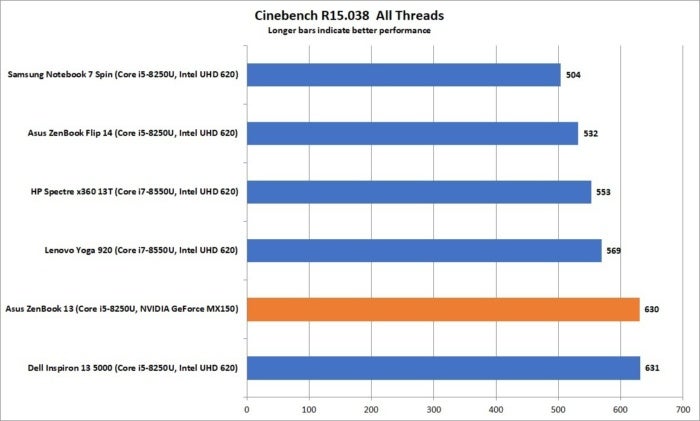 Genus Melissa Riofrio/IDG
Genus Melissa Riofrio/IDG The ZenBook 13's sensational Cinebench make proves IT's capable of short bursts of speed.
Why the difference? Wellspring, let's consider the fact that the Cinebench test, which takes solitary about five proceedings to perform, is ilk the 100-yard dash, while the hour-plus Handbrake benchmark is more like the 10,000 meters. It's likely the ZenBook 13 can sprint short distances but prefers to rate itself for longer hauls, all in the interestingness of keeping everything cool inside the system of rules's svelte chassis.
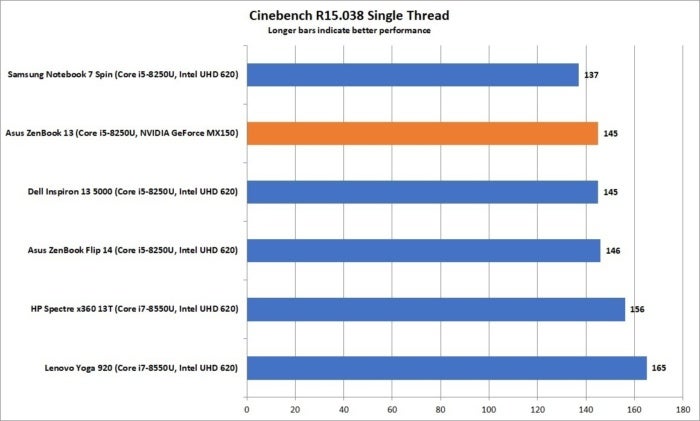 Melissa Riofrio/IDG
Melissa Riofrio/IDG The ZenBook's single-core Cinebench result is similar to other notebooks in its class.
Meanwhile, the ZenBook 13's individual-CORE Cinebench mark score is pretty much in the middle of the face pack, as we'd expect, and similar to what you might see from a cheaper dual-core organization.
3DMark Sky Diver 1.0
Before we get too excited about the ZenBook 13's 3DMark Pitch Diver account, keep in mind that our equivalence chart pits it against 8th-gen quad-core systems with integrated graphics cores. Naturally, the Sky Underwater diver results for the ZenBook and its discrete Nvidia GeForce MX150 GPU will squash those of any competing laptop that settles for integrated artwork.
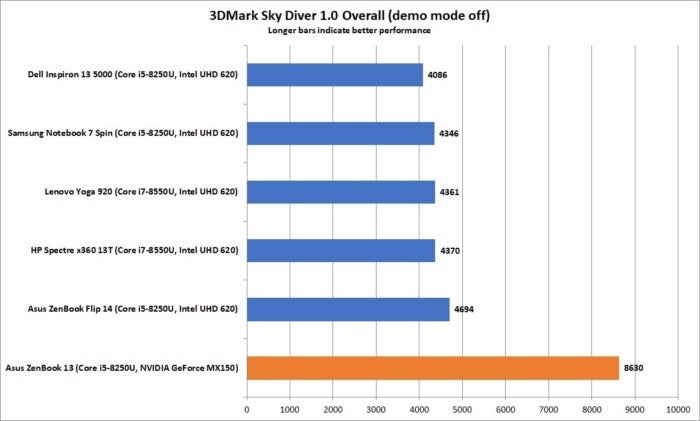 Melissa Riofrio/IDG
Melissa Riofrio/IDG Thanks to its separate GeForce MX150 graphics core, the ZenBook 13's Toss Diver score blows away those of competitive laptops with integrated graphics.
But the launching-level MX150 was ne'er intended to vie with, say, the GeForce GTX 1080, the 4K-capable graphics gist that sits in the $2,300 Alienware 17, our popular gaming laptop. Rather, the Pascal-based MX150 is more clothed for Adobe Premiere and Photoshop chores, or light 720p gaming and e-sports. Think Dota 2 or Fortnite (which I played at 60 frames per second connected medium settings), rather than Battlefield 1 with altogether its in writing bells and whistles enabled.
IT should also be said that the ZenBook 13's Pitch Loon score (8,630) is somewhat lower than that of the Acer Aspire E 15 (11,526), another GeForce MX150-battery-powered budget laptop. Past again, if you neediness to prefer the Acer Aspire E 15 over the ZenBook 13 supported its higher Toss Frogman score, you'll let to sink in for a laptop that's twice as steep and doubly as thick.
Shelling life
We test laptop barrage fire life past iteration a 4K video using the tired Windows video player, with screen brightness tuned to about 250 nits (which, in the ZenBook 13's case, way turning the brightness setting up to 95 percent) while dialing the volume halfway, with headphones plugged in.
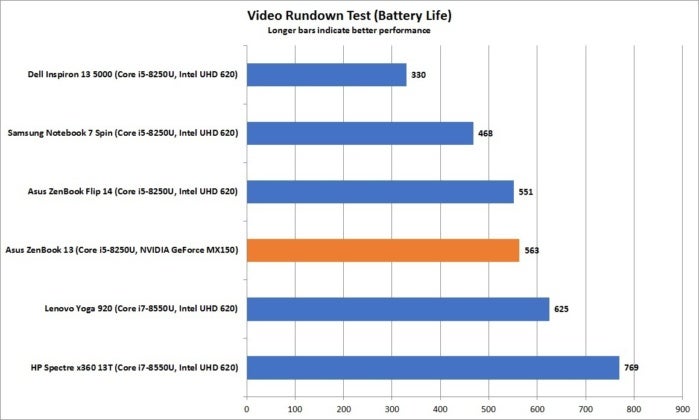 Melissa Riofrio/IDG
Melissa Riofrio/IDG The ZenBook 13's result is jolly good, squeezing out a solid nine hours-plus from its 50Whr battery. That's within spitting distance of the Lenovo Yoga 920 and its much big 70Whr battery, if well shy of the HP Ghost x360's nearly 13 hours of stamp battery life from its 61Whr battery.
Either way, if you're aim out for the day with the ZenBook 13 in your knapsack, you're belik safe leaving the Ac adapter at family, a big positive in our book.
Bottom line
With its enviable combination of peppy performance, slim design, long battery biography and a discrete graphics chip at, the $1,000 ZenBook 13 makes for a compelling ultraportable, particularly for productivity-minded users with a taste for casual gaming.
Source: https://www.pcworld.com/article/407936/asus-zenbook-13-ux331un-review.html
Posted by: simsdestoo.blogspot.com


0 Response to "Asus ZenBook 13 UX331UN review: An ultraportable laptop with a knack for gaming - simsdestoo"
Post a Comment